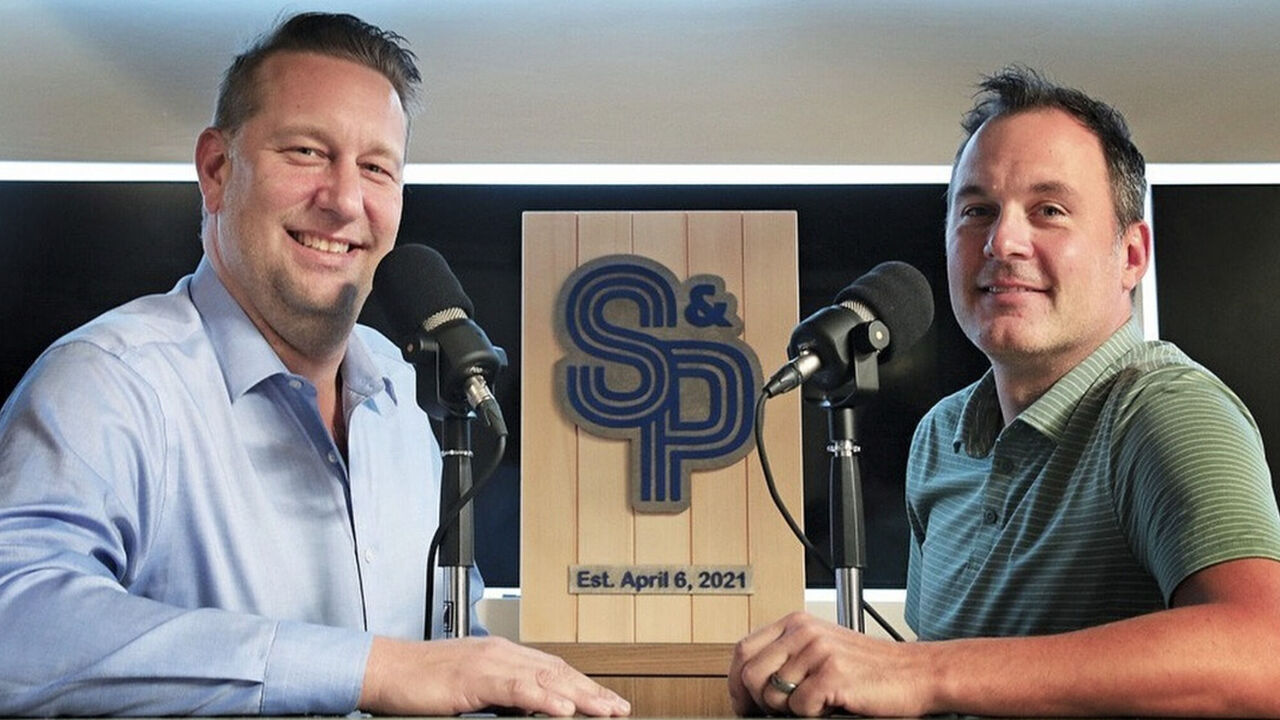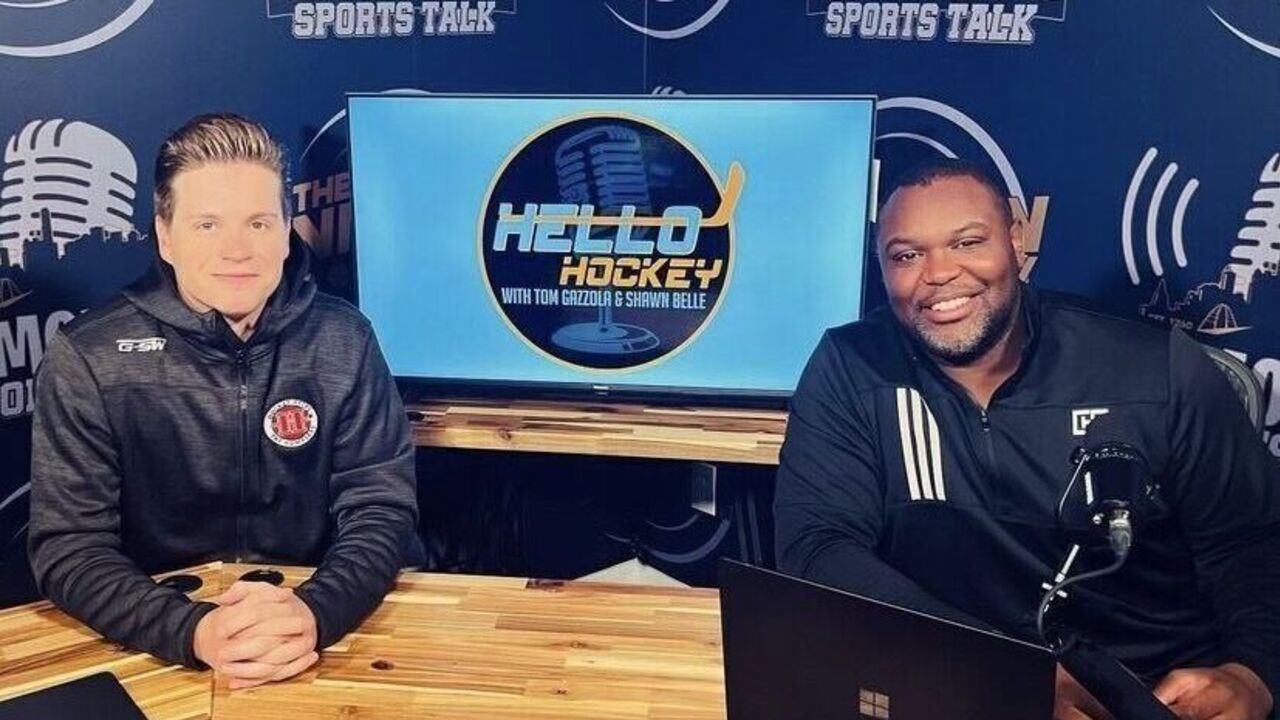'By us, for us': How sports talk radio found new life on the internet
It only took until 9 a.m. for a seemingly average Wednesday morning to become a demarcation line in time, changing everything for a group of sports talk radio hosts and their loyal fans.
The date was June 14, 2023. In hockey-crazed Edmonton, there was much to discuss. Less than 24 hours earlier, the Vegas Golden Knights - who had barreled through the Oilers on their way to the Stanley Cup Final - won their franchise's first championship, with their victory celebrations still ongoing and plenty to analyze about their stunning 9-3 win over the Florida Panthers.
Reports had also begun swirling that Michael Andlauer was buying the Ottawa Senators for an NHL-record $950 million. And Edmonton CFL fans were enduring what was to become a 22-game home losing streak; they wanted answers.
Tom Gazzola was prepared to deliver. Gazzola, who had made a name covering Edmonton sports in the preceding decade, was already live on TSN radio that morning, with a slate of guests and a rundown covering the top stories. That's when his station went from reporting the news to becoming it.
"I was just prepping in the commercial break, and the head of Bell Edmonton came in and she said, 'Hey, I need to see you in the boardroom for a second,'" Gazzola recalled.
He asked if the team should stall the broadcast by adding commercials and remembers being told engineering would take over. It was then he looked around the studio and could tell everyone had the same thought: "Is this it?"
But it was a rhetorical question. "We knew," he said.
It was 8:58 a.m. when Gazzola looked at his watch. A two-minute meeting confirmed his gut feeling. He recalls the words clearly: "As of 9 a.m. this morning, TSN Edmonton no longer exists."
As part of reducing its workforce by 1,300 people, Bell Media sold three of its radio stations and shut down Edmonton's TSN 1260 and five other stations across Canada. At the time, the company pointed to $40 million in annual operating losses that showed no sign of abating. The same trend had been the downfall of TSN-branded AM radio stations in Vancouver, Hamilton, and Winnipeg in February 2021.
In Canada's contracting media landscape, the news was simultaneously surprising and expected.
"When TSN Vancouver, Winnipeg, and Hamilton went down, we knew we were on the clock in Edmonton," Gazzola said. "Even though we were popular, profitable, and had a really good thing going."
Since Winnipeg's TSN 1290 shut down, Gazzola and his counterparts had been watching closely as former radio hosts Andrew Paterson and Michael Remis pivoted to the internet, capitalizing on their loyal fan base while owning their own content. It looked like they had a formula that could be replicated.
An underserved audience
Local radio might not have moved the needle on national, corporate media budgets, but the appetite for news and conversation about local sports still existed. Paterson, who hosted sports talk radio in Winnipeg for more than a decade prior to the station's closure, had a hunch he could monetize that audience on his own.
He launched a DIY solution with Remis dubbed Winnipeg Sports Talk - covering the Jets and the Blue Bombers of the CFL. "I was thinking, 'I can't believe they just shut this down the way they did. I've got a massive following, tons of people who love our content. There's got to be a way we can do this ourselves.'"
They wanted a name that was broad enough for future growth that could expand beyond their personal brands. Paterson calls the change the "best thing that's ever happened to us." After starting with four sponsors, they've now grown to 20, and they fully own their content. Their show is similar to what they previously presented on AM radio, but it's available in podcast form on demand each day for the drive home.
"I wanted to be able to deliver what we were doing, as best as possible, to be similar to what we did before," Paterson said. "It had to be fresh when people were on the ride home. So, we had to move the show up so we would record every day at 1 p.m. for a couple hours, and then get that thing up on the podcast feed by about 3:15 p.m. for people driving home. That was the original vision. We were just going to take what we used to do on the radio, make it a podcast, sell some sponsors, and have it ready at the same time every day. Now, instead of people turning on their AM radio, they're just getting it on their Bluetooth."
Today is the three year anniversary of the first episode of Winnipeg Sports Talk Daily. Thank you to our viewers, listeners and sponsors for your incredible support!
— Winnipeg Sports Talk (@SportsTalkWPG) March 8, 2024
Join us live for an extended show from 11am-3pm discussing all the moves ahead of the NHL's trade deadline and… pic.twitter.com/yDMX0f2Mqb
Winnipeg Sports Talk leveraged an idea that internet content creators have already proved works: serving niche audiences. Broadcasting talent can do so without having to operate inside a large conglomerate that is weighed down by concerns about debt or shareholder demands.
"We're proving every day that it was an absolutely stupid and short-sighted decision to shut down," Paterson said.
"During this time when we were off the air, my inbox on Twitter every day had probably about 30-40 messages along the lines of, 'This sucks. How can we hear you? I can't believe they shut it down.' People were really missing it. People are so accustomed to sports talk being part of their day. When you just turn that off - the demand is there to bring it back."
Similar demand was building in Vancouver. "It does seem a little short-sighted that a lot of these local AM stations across Canada are just completely shutting down when there's still an audience there," said Matthew Sekeres, who launched a podcast with partner Blake Price after TSN 1040 shut down. They've since joined The Nation Network and cover the Vancouver Canucks, BC Lions, and Vancouver Whitecaps. "When you host a talk radio show, you do develop bonds with listeners and with the community. … In the aftermath of the station going down, I learned that the bonds with our listeners were a lot stronger and deeper than I even imagined."
Winnipeg Sports Talk is eyeing next steps that will include hiring more staff and expanding its content offerings beyond the podcast and YouTube show. Paterson believes it'll be in a position to do that within a year. "If (Bell Media) would have just put a little bit more into focusing on the product and selling it, they would have been fine," he said.
Sekeres sees things the same way. "My bigger gripe with media is that you're forever looking at the cost side. When do you ever take a glance at how to grow revenue? Are you not supposed to be innovative? Particularly the salaries that some of these media executives are getting paid, if you're getting paid that kind of money, then your solution shouldn't be as simple as, 'Let's look at the balance sheet and cut.' It takes no talent to do that. It takes talent to grow radio, to grow revenues, and I just don't see a lot of that happening in the Canadian media landscape right now," he said.

Building a format
In Edmonton, Dustin Nielson was watching what Winnipeg Sports Talk was doing and thought it might have a winning formula. Prior to TSN 1260's shutdown, he had slowly been building up podcasts on the side, reserving domain names, and preparing for the inevitable. When the station went dark, he was ready. He rallied Gazzola and others who'd been stranded by TSN's closure and got to work.
"I contemplated a couple of times just leaving 1260 and trying to do this on my own because I could see that it could be successful. But with 1260 in the market, there would have been legitimate competition," Nielson said. "I waited. But as soon as I got the call that we were done, I knew we were going to try this."
Nielson signed early sponsors who believed in his work at TSN and were willing to support something new. By Sept. 6, 2023, Edmonton Sports Talk was ready to go live as an online digital station, which is available not just as a podcast or on YouTube but on TuneIn and iHeartRadio over the internet.
"In Edmonton, they've taken it a step further than we did. They rented an office and essentially replicated a radio station," Paterson said.
Edmonton Sports Talk, which borrowed the name format from its Winnipeg forerunners, has partnered with 48 sponsors in its first year and has a 12-hour slate of fresh programming each day. It'll soon expand to a team of 11, which includes a three-person sales division. Instead of focusing on ads, all of Edmonton Sports Talk's sponsorships are tie-ins, and it's created some ambitious partnerships within the community - including its own beer, the Six O'Clocker Lager, with local craft brewer Alley Kat.
The boys from Edmonton Sports Talk made their way down to Alley Kat Brewery last week and here's how it went... @nielsontsn1260 @lieutenant_eric @tomgazzola @matthewiwanyk pic.twitter.com/QmakItKs4A
— Edmonton Sports Talk (@yegsportstalk) October 3, 2023
Edmonton Sports Talk has grown to more than 10,000 subscribers on YouTube and recently announced it's adding a new drive-time host: Reid Wilkins, who left in-market leader 630 CHED after an 11-year tenure hosting "Inside Sports." The station also acquired rights to the Edmonton Riverhawks of independent baseball's West Coast League and the Edmonton Stingers of the Canadian Elite Basketball League while launching social and community events such as the first annual EST Golf Classic and its own award show - the ESTYs, which will take place later in September.
Most of that growth has been organic, spurred by a community of listeners eager to talk sports. "Once people understand what we're doing, they stick around," Nielson said.

The team at EST hopes that momentum will continue. "What we've learned and trusted is that people still want to listen," Gazzola said. "People still want to hear something on their car radio, just how they get it is changing and evolving. You don't need a radio signal anymore. Our mindset is: Put it out there to as many people on as many platforms as possible - visual, audio, however you want to consume it - so people know that we're there."
Unlike corporate radio programming conceived in a boardroom thousands of kilometers away from its intended audience, podcasts and internet radio are homegrown solutions. And listeners in Canadian sports markets are supporting them. "In some regards, it's almost charming," Sekeres said. "It's like reverting back to the days when the radio stations, and the newspapers, and the television stations were owned locally by us, for us."
Jolene Latimer is a feature writer at theScore.